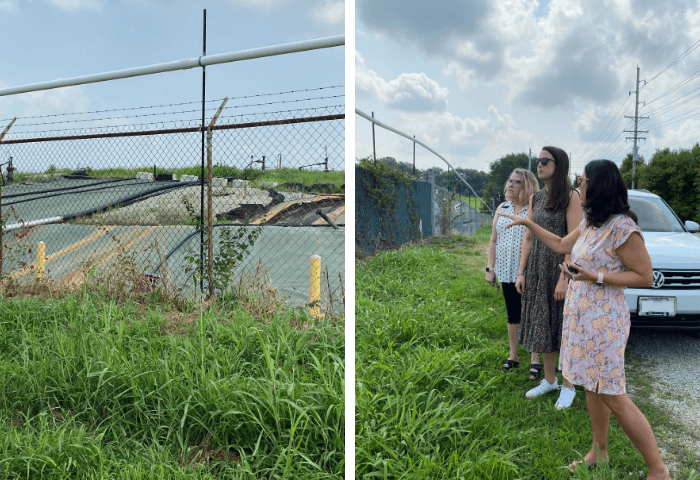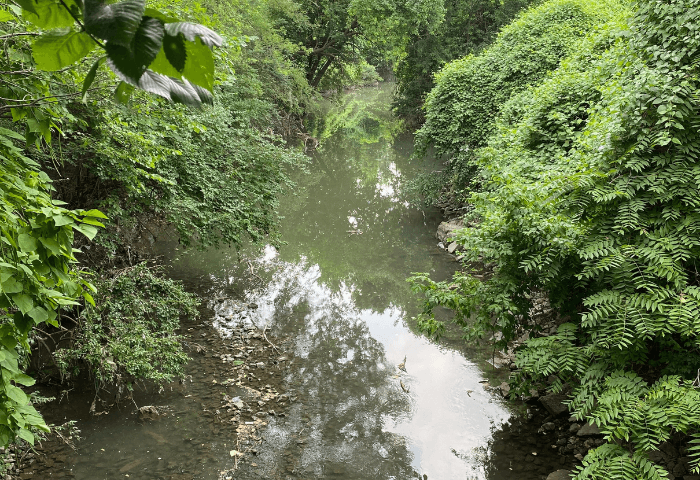Just a week prior, in the middle of planning her daughter’s fifth birthday party, Dawn learned the odors were emitted by an underground fire at a nearby landfill which was also contaminated with radioactive waste from the Manhattan Project. The site had been declared a Superfund site by the U.S. Environmental Protection Agency (EPA) in 1990.
After the event, the two talked for three hours in the biting cold outside Karen’s home. “We didn’t even have the sense to go inside. That’s how focused we were and how it just crippled us. We couldn’t believe what we were learning and hearing,” Karen recalled. “From that point on we were attached at the hip. And we were determined.”
Together they formed the non-profit, Just Moms STL, in 2014 to raise awareness and engagement in their community about the West Lake Landfill site. Their determination contributed to a new clean up plan to remove a majority of the radioactive material and make the surrounding community safer. Dawn and Karen continue to work with EPA to finalize the clean up plan and also help others advocate for the health and safety of their communities.

Pictured: Lori Gilley, Meg Nakaraha and Dawn Chapman standing outside the West Lake Landfill site. Photo by Karen Nickel.
Starting in 2020, they’ve been invited experts at a number of COMPASS risk communication programs for federal agency staff where they share their experience with environmental injustice to help participants understand the perspective of affected communities.
A vital lesson Karen and Dawn emphasize is the importance of giving people space to have an emotional response and grieve. Dawn gave an example from a role-play activity in one of the workshops where she played the role of a community member learning her family had been exposed to hazardous chemicals, “My response to the information was accurate. It’s what you would expect when you tell someone that this could potentially cause the death of one of their loved ones, but the person walked away feeling like they had failed because I was upset. It was kind of a shock to that individual when I said, ‘No, you did a good job communicating the risk. I had that reaction because I understood what was happening. You’ve informed me, but you can’t control my emotions. I’m entitled to that emotional response.”
Dawn and Karen empathize with scientists and researchers who are tasked with delivering bad news to affected communities, especially when they don’t have the authority or ability to fix the situation. “There might be a portion of this job that you never get comfortable with, nor should you,” Dawn stated. “We understand you’re frustrated because you feel like there’s nothing you can do to help or like your answers aren’t good enough, but to a community, that frustration would feel like it’s directed at them for asking questions. If you make it seem as though their emotion is in your way or if you project frustration with their emotion, you’ve lost trust.”
“Our trust was severed a long time ago,” Karen added. “One of the hardest things we went through was sitting down and trying to rebuild that trust…I remember being told the radioactive waste would be removed because it’s dangerous, but before some of these same people had ignored us and told us everything was fine. It’s hard to this day. The decision [to remove the waste] was good news, but I don’t like to use the word ‘win’ because, what do I win? In the end, I don’t win. My kids don’t win… I don’t know what’s coming down the pipe for my kids or my grandkids. I don’t know what’s coming down the pipe for me. I already have illnesses that debilitate me sometimes. Dawn got the realization of what it’s like to have a sick child now. We don’t have wins.”

Coldwater Creek, near Karen’s childhood home, was declared an U.S. Environmental Protection Agency (EPA) Superfund site in 1989. Photo by Karen Nickel.
There are no easy paths to regaining trust, but for Dawn and Karen it starts with listening and acknowledging someone’s experience and the hardships they’ve faced. “Overall the biggest and most important thing – that’s so tiny – is ‘I’m sorry. I’m sorry that this has happened to you.’” Karen expressed, “When [a high-level staff member] stood in a meeting of about 1500 people and said, ‘I am sorry that this has been allowed to happen to you,’ the room went silent. We had so many messages from people saying they had a little bit of hope now. It wasn’t an admission of guilt, just acknowledging what we were going through.”
Public engagement is challenging, especially when it involves conveying risk. As science communicators, we won’t always have all the answers. Communicating with empathy and compassion, and owning our mistakes and limitations, takes effort and practice but makes a significant difference for the people we engage with.
“It didn’t have to be this hard for Karen and I. It’s amazing how [our experience] could have turned around with just a little bit of training,” Dawn says. “Karen and I joke – but it’s not a joke – that we’ll drop everything to attend one of these workshops. The outcome is that important to what we do. It is so profound when we see people change how they communicate.”



